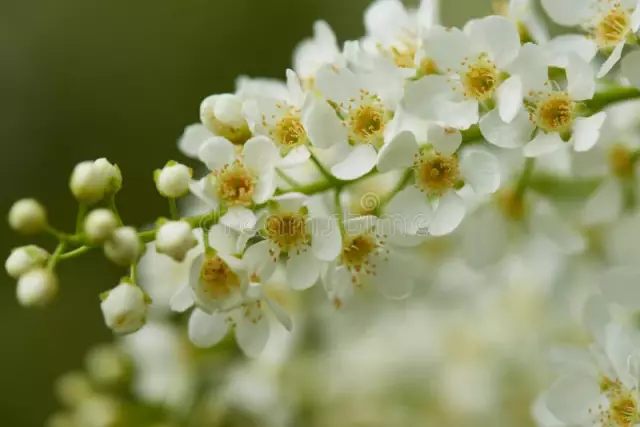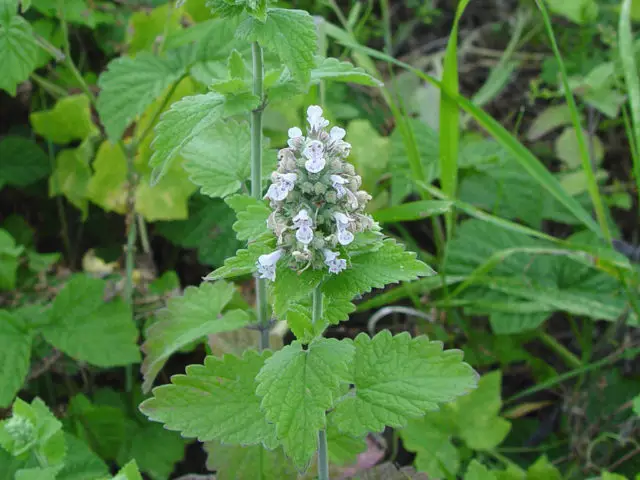- Author Rachel Wainwright wainwright@abchealthonline.com.
- Public 2023-12-15 07:39.
- Last modified 2025-11-02 20:14.
Bird cherry
Instructions for use:
- 1. Composition and useful properties
- 2. Application
- 3. Contraindications and harm
Bird cherry is a shrub up to 15 meters high.

The trunk of the bird cherry is distinguished by cracking black-gray bark. The branches of the plant are rather thin, so they always sag down to the bottom. In winter, the buds of bird cherry are covered with peculiar cilia. They are round, spherical. Bird cherry leaves are bright green, oblong, elongated. Bird cherry flowers are known to many of us for their bright, unique aroma. A brush with white flowers is a bird cherry inflorescence.
The bird cherry blossoms from April to June. Bird cherry loves the sun, therefore it develops poorly in the shade. Bird cherry grows in nature along river banks, on forest edges, in thickets of bushes.
The most common popular names for common bird cherry are as follows:
- Cheremshina;
- Glotiha;
- Bell.
Composition and useful properties of common bird cherry
Bird cherry has long been recognized by many, thanks to its medicinal properties. Almost all parts of this shrub are used in traditional medicine, since the list of useful properties of bird cherry is extremely wide. Thus, bird cherry is considered to be a storehouse of beneficial properties for human health.
The main value of the bird cherry is represented by the components that make up its composition:
- Vitamins;
- Tannins;
- Organic acids;
- Glycosides;
- Acids;
- Anthocyanins;
- Saccharides;
- Rutin;
- Oils;
- Flavonoids;
- Phytoncides.
In addition, free hydrocyanic acid and benzoic aldehyde are quite rare substances in bird cherry.
Due to such a rich composition, bird cherry has numerous properties used for the treatment and prevention of many diseases:
- Diaphoretic;
- Diuretic;
- Anti-inflammatory;
- Anti-scurvy;
- Contraceptive;
- Sedative;
- Toning;
- Hemostatic.
The use of bird cherry
All parts of the plant are used for medicinal purposes. But the fruits of common bird cherry are considered the most valuable and are most used.
In traditional medicine, the fruits of the bird cherry are used as a means that has the following effect:
- General strengthening;
- Astringent;
- Bactericidal;
- Anti-inflammatory;
- Fastening;
- Normalizing.
The fixing and normalizing properties of common bird cherry are especially relevant for pathologies of the stomach and intestines.
The bark of the common bird cherry also has considerable benefits. So, this part of the plant is often used to make preparations belonging to the following pharmacological groups:
- Diuretic;
- Diaphoretic;
- Antipyretic.
Preparations based on bird cherry are excellent for colds, flu, sore throat. In addition, the infusion of cherry fruits will help strengthen the immune system and resist infections in the autumn-winter period.
The leaves of the common bird cherry have a powerful fixing property. A decoction of bird cherry leaves is used for diarrhea, intoxication, disorders and digestive disorders.
The flowers of bird cherry are extremely useful for all kinds of inflammation, especially those associated with cuts, wounds or burns. Common bird cherry is quite capable of helping a person with vitamin deficiency, loss of strength and a decrease in the body's defenses.
The list of diseases in which the beneficial properties of bird cherry are effectively helped is extremely wide:
- Diseases of the gastrointestinal tract;
- Decreased sexual function;
- Bronchitis;
- Pneumonia;
- Radiculitis;
- Conjunctivitis;
- Fever;
- Anemia;
- Gout;
- Pulmonary tuberculosis;
- Venereal diseases.
Regular use of bird cherry can increase potency in men, normalize bowel activity, and quickly cure any cold disease. The excellent anti-inflammatory property of common bird cherry is due to the presence of phytoncides in its composition. These substances are actively fighting harmful microorganisms:
- Microbes;
- Bacteria;
- Fungi;
- Mold
- Insects.
The use of bird cherry inside and outside (on the skin) leads to the fact that insects (flies, mosquitoes) stop biting a person. The same prophylaxis method can be used against ticks.
A decoction of bird cherry twigs and leaves helps to relieve rheumatic pains. To do this, you need to drink it regularly and adhere to the rules of a healthy lifestyle. This remedy is suitable for both articular and muscular rheumatism.
Skin problems such as furunculosis, dermatitis, ulcers on the body are treated with infusion of bird cherry stems and leaves. With this infusion, you need to regularly wash the affected skin.
Bird cherry ordinary has a valuable property to have a beneficial effect on the state of human vision. So, with a strong load on the eyes, for example, with prolonged work at the computer, you need to make lotions from a decoction of bird cherry. To prevent eye diseases and relieve stress, you can do this procedure once a week. But when treating an existing disease or with visual impairment, of course, treatment should be carried out much more often. Prevention of vision problems with the help of such lotions and the ingestion of infusion of the fruits of bird cherry, its leaves and flowers will allow you to maintain excellent vision for life.

The beneficial effect of bird cherry on human skin is also manifested in its ability to clear acne. So, regularly using a decoction of twigs and bird cherry bark as a lotion, you can get rid of rosacea and dermatosis. In addition, masks from the fruit of bird cherry and taking the decoction inside provide a rejuvenating effect. Thus, the appearance of wrinkles and skin aging can be avoided.
The common bird cherry is used not only in pharmaceuticals, but also in cosmetology, food industry, and perfumery.
Traditional medicine has many recipes using bird cherry. Doctors focus their patients' attention on adherence to the dosage of such a medicine.
Contraindications and harm from common bird cherry
When carrying out treatment with drugs based on common bird cherry, its decoctions and infusions, it is necessary to obtain the approval of the attending physician. You need to be especially careful with the doses of medications containing seeds, bark and leaves of the plant. The fact is that these parts of common bird cherry contain amygdalin glycoside. This substance has the property of decomposing as a result of a chemical reaction in the human body into hydrocyanic acid and glucose. Glucose is necessary for a person and is beneficial, but hydrocyanic acid is considered poisonous. Therefore, its excessive formation in the body can lead to poisoning (intoxication).
Some danger can be posed by a combination of active substances in the composition of bird cherry with other drugs that a person uses. Therefore, before using it for treatment, you need to consult your doctor. An absolute contraindication for taking medications from bird cherry is pregnancy and lactation (breastfeeding).
Information about the drug is generalized, provided for informational purposes only and does not replace the official instructions. Self-medication is hazardous to health!






